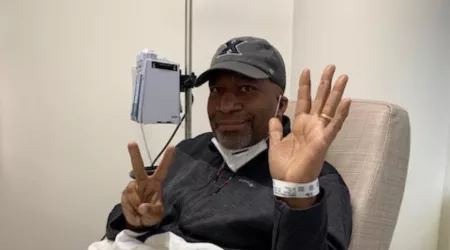Emotional health with colorectal cancer
Just as cancer affects your physical health, it may bring up many new emotions, which may change often. These feelings are normal and can be managed.

These feelings are normal
Colorectal cancer may trigger a range of emotions from anxiety and sadness to anger and despair. It’s crucial to acknowledge these feelings and seek emotional and psychological support.
Common emotions among colorectal cancer patients
Overwhelmed
When you first learn that you have cancer, it's normal to feel as if your life is out of control. This could be because:
- You wonder if you're going to live.
- Your normal routine is disrupted by doctor visits and treatments.
- People use medical terms that you don't understand.
- You feel like you can't do the things you enjoy.
- You feel helpless and lonely.
Even if you feel out of control, there are ways you can take charge. It may help to learn as much as you can about your cancer. The more you know, the more in control you'll feel. Ask your doctor questions, and don't be afraid to say when you don't understand.
For some people, it feels better to stay busy. If you have the energy, try taking part in activities such as music, crafts, reading, or learning something new.
Anger
It's very normal to ask, "Why me?" and be angry at the cancer. You may also feel anger or resentment towards your healthcare providers, your healthy friends, and your loved ones. And if you're religious, you may even feel angry with God.
Anger often comes from feelings that are hard to show. Common examples are:
- fear
- panic
- frustration
- anxiety
- helplessness
If you feel angry, you don't have to pretend that everything is OK. It's not healthy to keep it inside you. Talk with your family and friends about your anger. Or ask your doctor to refer you to a counselor. And know that anger can be helpful in that it may motivate you to take action.
Fear and Worry
It's scary to hear that you have cancer. You may be afraid or worried about:
- being in pain, either from the cancer or the treatment
- feeling sick or looking different as a result of your treatment
- taking care of your family
- paying your bills
- keeping your job
- dying
Some fears about cancer are based on stories, rumors, or wrong information. To cope with fears and worries, it often helps to be informed. Most people feel better when they learn the facts. They feel less afraid and know what to expect. Learn about your cancer and understand what you can do to be an active partner in your care. Some studies even suggest that people who are well-informed about their illness and treatment are more likely to follow their treatment plans and recover from cancer more quickly than those who are not.
Hope
Once people accept that they have cancer, they often feel a sense of hope. There are many reasons to feel hopeful. Millions of people who have had cancer are alive today. Your chances of living with cancer—and living beyond it—are better now than they have ever been before. And people with cancer can lead active lives, even during treatment.
Some doctors think that hope may help your body deal with cancer. So, scientists are studying whether a hopeful outlook and positive attitude help people feel better. Here are some ways you can build your sense of hope:
- Plan your days as you've always done.
- Don't limit the things you like to do just because you have cancer.
- Look for reasons to have hope. If it helps, write them down or talk to others about them.
- Spend time in nature.
- Reflect on your religious or spiritual beliefs.
- Listen to stories about people with cancer who are leading active lives
Stress and Anxiety
Both during and after treatment, it's normal to have stress over all the life changes you are going through. Anxiety means you have extra worry, can't relax, and feel tense. You may notice that:
- Your heart beats faster.
- You have headaches or muscle pains.
- You don't feel like eating. Or you eat more.
- You feel sick to your stomach or have diarrhea.
- You feel shaky, weak, or dizzy.
- You have a tight feeling in your throat and chest.
- You sleep too much or too little.
- You find it hard to concentrate.
If you have any of these feelings, talk to your doctor. Though they are common signs of stress, you will want to make sure they aren't due to medicines or treatment. Stress can keep your body from healing as well as it should.
If you're worried about your stress, ask your doctor to suggest a counselor for you to talk to. You could also take a class that teaches ways to deal with stress. The key is to find ways to control your stress and not to let it control you.
Sadness and Depression
Many people with cancer feel sad. They feel a sense of loss of their health, and the life they had before they learned they had the disease. Even when you’re done with treatment, you may still feel sad. This is a common response to any serious illness. It may take time to work through and accept all the changes that are taking place.
When you're sad, you may have very little energy, feel tired, or not want to eat. For some, these feelings go away or lessen over time. But for others, these emotions can become stronger. The painful feelings don't get any better, and they get in the way of daily life. This may mean you have depression. Some people don't know that depression is a medical condition that can be treated. For some, cancer treatment may have added to this problem by changing the way the brain works.
Depression can be treated. Below are common signs of depression. If you have any of the following signs for more than two weeks, talk to your doctor about treatment. Be aware that some of these symptoms could be due to physical problems, so it's important to talk about them with your doctor.
Emotional signs:
- feelings of sadness that don't go away
- feeling emotionally numb
- feeling nervous or shaky
- having a sense of guilt or feeling unworthy
- feeling helpless or hopeless, as if life has no meaning
- feeling short-tempered, moody
- having a hard time concentrating, feeling scatterbrained
- crying for long periods of time or many times each day
- focusing on worries and problems
- no interest in the hobbies and activities you used to enjoy
- finding it hard to enjoy everyday things, such as food or being with family and friends
- thinking about hurting yourself
- thoughts about killing yourself
Body changes:
- unintended weight gain or loss not due to illness or treatment
- sleep problems, such as not being able to sleep, having nightmares, or sleeping too much
- racing heart, dry mouth, increased perspiration, upset stomach, diarrhea
- changes in energy level
- fatigue that doesn't go away
- headaches, other aches and pains
If your doctor thinks that you suffer from depression, they may give you medicine to help you feel less tense. Or they may refer you to other experts. Don't feel that you should have to control these feelings on your own. Getting the help you need is important for your life and your health.
Guilt
If you feel guilty, know that many people with cancer feel this way. You may blame yourself for upsetting the people you love or worry that you're a burden in some way. Or you may envy other people's good health and be ashamed of this feeling. You might even blame yourself for lifestyle choices that you think could have led to your cancer.
Remember that having cancer is not your fault. It may help you to share your feelings with someone. Let your doctor know if you would like to talk with a counselor or go to a support group. (See more tips below.)
Loneliness
People with cancer often feel lonely or distant from others. This may be for a number of reasons:
- Friends sometimes have a hard time dealing with cancer and may not visit or call you.
- You may feel too sick to take part in the hobbies and activities you used to enjoy.
- Sometimes, even when you’re with people you care about, you may feel that no one understands what you’re going through.
It’s also normal to feel alone after treatment. You may miss the support you got from your health care team. Many people have a sense that their safety net has been pulled away, and they get less attention. It’s common to still feel cut off from certain friends or family members. Some of them may think that now that treatment is over, you will be back to normal soon, even though this may not be true. Others may want to help but don’t know how.
Look for emotional support in different ways. It could help you to talk to other people who have cancer or to join a support group. Or you may feel better talking only to a close friend, family member, counselor, or a member of your faith or spiritual community. Do what feels right for you.
Gratitude
Some people see their cancer as a "wake-up call." They realize the importance of enjoying the little things in life. They go places they've never been. They finish projects they had started but put aside. They spend more time with friends and family. They mend broken relationships.
It may be hard at first, but you can find joy in your life if you have cancer. Pay attention to the things you do each day that make you smile. They can be as simple as drinking a good cup of coffee, being with a child, or talking to a friend.
You can also do things that are more special to you, like being in nature or praying in a place that has meaning for you. Or it could be playing a sport you love or cooking a good meal. Whatever you choose, embrace the things that bring you joy when you can.

These feelings can be managed
Coping with the emotional impact of colorectal cancer involves various strategies. It’s essential for patients to prioritize self-care, ensuring they are mentally, emotionally, and physically nurtured along their path.
Ways to cope with your emotions
Express your feelings
People have found that when they express strong feelings like anger or sadness, they're more able to let go of them. Some sort out their feelings by talking to friends or family, other cancer survivors, a support group, or a counselor. But even if you prefer not to discuss your cancer with others, you can still sort out your feelings by thinking about them or writing them down.
Look for the positive
Sometimes this means looking for the good even in a bad time or trying to be hopeful instead of thinking the worst. Try to use your energy to focus on wellness and what you can do now to stay as healthy as possible.
Don't blame yourself for your cancer
Some people believe that they got cancer because of something they did or did not do. But scientists don't know why one person gets cancer and one person doesn't. All bodies are different. Remember, cancer can happen to anyone.
Don't try to be upbeat if you're not
Many people say they want to have the freedom to give in to their feelings sometimes. As one woman said, “When it gets really bad, I just tell my family I'm having a bad cancer day and go upstairs and crawl into bed.”
You choose when to talk about your cancer
It can be hard for people to know how to talk to you about your cancer. Often loved ones mean well, but they don't know what to say or how to act. You can make them feel more at ease by asking them what they think or how they feel.
Find ways to help yourself relax
Whatever activity helps you unwind, you should take some time to do it. Meditation, guided imagery, and relaxation exercises are just a few ways that have been shown to help others; these may help you relax when you feel worried.
Be as active as you can
Getting out of the house and doing something can help you focus on other things besides cancer and the worries it brings. Exercise or gentle yoga and stretching can help too.
Look for things you enjoy
You may like hobbies such as woodworking, photography, reading, or crafts. Or find creative outlets such as art, movies, music, or dance.
Look at what you can control
Some people say that putting their lives in order helps. Being involved in your health care, keeping your appointments, and making changes in your lifestyle are among the things you can control. Even setting a daily schedule can give you a sense of control. And while no one can control every thought, some say that they try not to dwell on the fearful ones, but instead do what they can to enjoy the positive parts of life.
Top resources

Chris Amos: a patient in a family of survivors
Though facing a colorectal cancer (CRC) diagnosis isn’t easy, Chris continues to show up with grace and courage as he moves through his journey to wellness.

Pet therapy for cancer patients
Pets can be an incredible source of comfort and joy for anybody but, for cancer patients, pet therapy can provide emotional and psychological support to enhance a person’s overall well-being.

Integrative wellness: Supplemental supports for managing a colorectal cancer diagnosis
Finding out you or a loved one has colorectal cancer can be overwhelming. While standard treatments like surgery, chemotherapy, and radiation remain the cornerstone of cancer care, many patients are exploring supportive therapies to enhance their overall quality of life.





